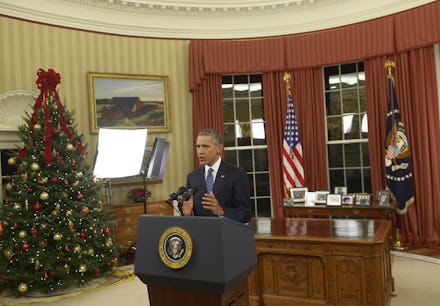This Reporter Dropped Some Serious ISIS Knowledge in Tweet Marathon After Obama's Speech

Following President Barack Obama's Oval Office address Sunday night, award-winning foreign correspondent Rukmini Callimachi added her expertise to the conversation in a 19-tweet marathon that could easily comprise the syllabus of an ISIS 101 course.
Callimachi, who covers al-Qaida and ISIS for the New York Times, shed light on the biggest problems not addressed in the president's four-pronged plan to combat the Islamic State.
But first, the reporter praised the president for "do[ing] his homework" in acknowledging that sending troops to Iraq and Syria would be playing into the hands of ISIS, who, she said, is desperate for the U.S. to bring the war to them.
"We should not be drawn once more into a long and costly ground war in Iraq or Syria," the president said in his address. "That's what groups like ISIL want. ... They also know that if we occupy foreign lands, they can maintain insurgencies for years, killing thousands of our troops, draining our resources and using our presence to draw new recruits."
Eight tweets in, Callimachi asks the question that should take priority in the Situation Room.
Callimachi cites her firsthand accounts from Syria and Iraq, where she witnessed three factions of Kurdish militia fighting ISIS.
(The PKK, also known as the the Kurdistan Workers' Party, is a left-wing, militarized political party based in Turkey. The YPG — or the People's Protection Units — on the other hand, is the army equivalent for the Kurdish Supreme Committee, the de facto government in the part of Syria regarded by many as Kurdistan. The Peshmerga, in northern Iraq, are the most historically rooted of these three, dating back to the late 1800s.)
The success of these forces, the reporter reminds, is not only achieved through military and political cohesion, but also continued air strikes from the U.S.
Callimachi said she witnessed this current lack of cohesion on the ground. While these various factions may all be pro-Kurdish, that ultimately translates into different goals, in different territories, as exemplified by one Peshmerga commander who would only protect half of key city Mosul, in northern Iraq, "because that is the ethnic faultline, and as a Kurdish commander he did not think it would be appropriate to go further in," she tweeted.
While Kurdish forces are responsible for much of the ISIS pushback on the ground, she said, here's the kicker: The most crucial cities, strategically, for winning this battle are not primarily Kurdish — they're Sunni.
Having spent years covering this arena, Callimachi is well-positioned to understand the complexities and intricacies of this scattered war. She wrote extensively on the operations of extremist Islamic terrorist groups — from al-Qaida's financing through European ransoms to the experience of ISIS hostages — and has spent substantial time in territories relevant to this situation.
In short, those tasked with ensuring the defeat of ISIS would do well to read Callimachi's Twitter feed.
Get the news everyone's talking about delivered straight to your inbox every morning by signing up for MicCheck Daily.